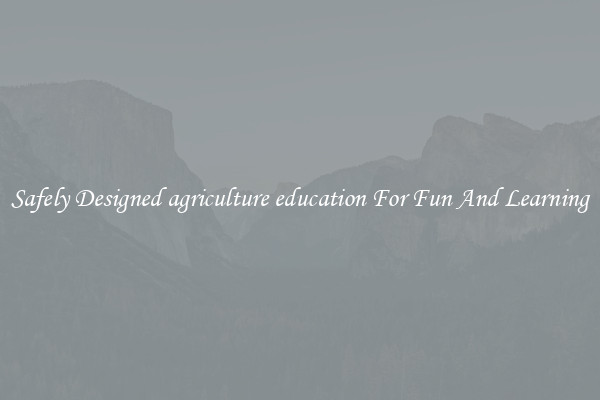Safely Designed agriculture education For Fun And Learning
Safely Designed Agriculture Education: Fun and Learning

Agriculture education is an essential aspect of a child's learning journey. It enables them to understand the importance of farming, food production, and sustainable practices. However, it is vital to ensure that agriculture education programs are safely designed to provide a fun and engaging learning environment.
Safety should always be the top priority when designing agriculture education programs. This involves implementing measures to protect the well-being of students, teachers, and any other individuals involved. Equipment used in agriculture education should be regularly inspected, maintained, and operated by trained professionals. Additionally, proper safety gear, such as gloves and goggles, should be provided to ensure students are protected during hands-on activities.
One way to make agriculture education fun and engaging is by incorporating interactive learning methods. Children learn best when they have hands-on experiences and can actively participate in various activities. For instance, setting up a small vegetable garden in the schoolyard allows students to learn about planting, growing, and nurturing plants. They can experience the joy of watching their hard work pay off as they harvest fresh produce.
Another exciting aspect of agriculture education is involving animals. However, it is crucial to educate children about animal safety and welfare. Children should be taught how to approach animals gently, respect their space, and handle them with care. Expert guidance should be provided to ensure that animals are well-cared for and that no harm comes to them or the students.
Implementing field trips to local farms is an excellent way to expose students to real-life farming practices. These trips can provide a valuable learning experience and allow children to interact with farmers and see firsthand how food is grown and harvested. However, it is essential to ensure that these trips are safe by following appropriate safety protocols, such as proper supervision and limiting access to potential hazards.
Furthermore, agriculture education programs can incorporate games and competitions to make learning more enjoyable. For example, organizing a farming-themed scavenger hunt or a quiz about different crops and animals can stimulate curiosity and foster healthy competition among students. These activities not only make learning more entertaining but also allow students to apply their knowledge in a practical setting.
In conclusion, safely designed agriculture education programs provide an excellent opportunity for children to learn about farming, food production, and sustainability. By prioritizing safety measures, incorporating interactive learning methods, and ensuring the welfare of animals, these programs can create a fun and engaging environment for students. Agriculture education not only equips children with essential knowledge but also instills a sense of appreciation for the hard work of farmers and the importance of sustainable practices.

View details

View details

View details

View details








